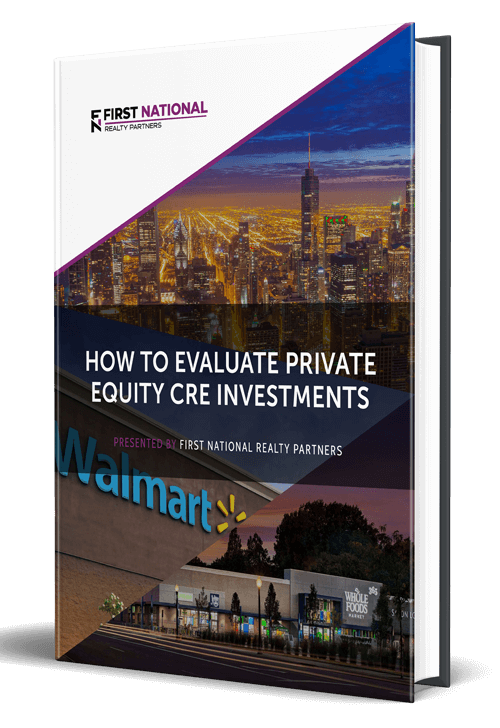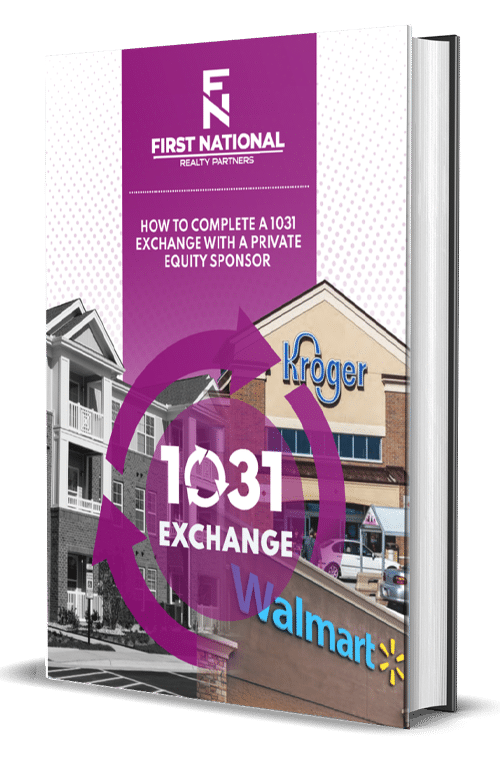Many investors are surprised to learn that there is more than one ownership structure in a commercial real estate transaction. In this article, we will describe two of the most common – fee simple and ground leases. We will describe what each of these structures look like, the key differences between the two, the risks and benefits of each, and how working with a private equity real estate firm can prove to be beneficial.
At First National Realty Partners, we typically purchase properties with a “fee simple” ownership structure. However, there are certain scenarios where ground leases make sense. We evaluate deals with both structures and typically choose the one with the most potential profit for our investors. To learn more about our current investment opportunities, click here.
Fee Simple Ownership Structure Explained
In a fee simple ownership structure, the property owner has complete ownership over an entire property which includes the ground and all improvements built on top of it. This is probably the most common real estate ownership structure and it is typically implied when a transaction calls for the “purchase” of a property. But, as the introduction suggests, this is not the only way to gain control of a commercial property.
Ground Leases Explained
The other major ownership structure in commercial real estate is a ground lease. In this structure, sometimes called a “leasehold interest“, the investor/owner does not have ownership of the ground, but they do have ownership of all improvements built on top of it. For example, a developer could sign a ground lease for a vacant piece of land and with it comes permission to construct a building on the property. Once complete, the developer owns the building, but the property owner retains ownership of the land. Ground leases are more common in dense, metro areas like New York and Miami, Florida because real property is scarce and owners may be reluctant to sell it.
The terms of a ground lease can vary widely, but the term of the lease is typically long, 20+ years, and they typically include periodic escalations that call for rent increases at periodic intervals.
Fee Simple vs. Ground Lease
As the descriptions above suggest, the key difference between fee simple ownership and a ground lease is ownership of the dirt. Naturally, this may beg the question…what are the advantages and risks of each structure?
Risks and Benefits of Each Structure
There are risks and benefits to each structure for both property owners and investors.
Fee Simple
Benefits
Generally, a deal with fee simple ownership is “cleaner” in the sense that it is very clear who owns what because the property owner transfers ownership, dirt and all, to the buyer. The boundaries of the property are very clear on a survey and the buyer knows exactly what they are getting. Because there is less complexity to this transaction, they may also be more attractive to potential buyers.
The other major benefit of a fee simple deal is that, because it is cleaner, they are also easier to finance because the lender has a clear path to place a first position lien on the property. As a result, the terms may also be more favorable.
Risks
The major risk of a fee simple purchase is that it requires a significant amount of upfront capital, usually 20% – 40% of the purchase price. For example, suppose that a property has a price of $1MM and a lender was willing to fund 80% ($800,000). This means that the investor would have to come up with $200,000 on their own to get the deal closed.
Ground Lease
Benefits
For a commercial real estate investor/developer, the major benefit of a ground lease is that the amount of cash needed to get into a deal is substantially lower. Instead of having to come up with a big down payment for a fee simple purchase, they just need to come up with the funds needed to negotiate and make the first payment on the lease.
For the property owner (the lessor), the major benefit of a ground lease is that they get to retain ownership of the land and develop a stream of income from the rent payments charged to the developer (the lessee). In some cases, there may even be a reversion of the improvements back to the property owner at the end of the land lease term.
Risks
In a ground lease structure, the major risk is getting financing. In almost all commercial real estate transactions, a senior lender needs to secure their loan with a first position lien on the property. But, the borrower in a ground lease transaction is not the land owner so they aren’t able to provide this to a lender. Instead, they need to get the land owner to “subordinate” their interest to the lender. While necessary, this comes with risks. In an absolute worst case scenario, the land owner could lose the leased property to a lender without any compensation for it.
Why Investors Need To Understand The Difference
As a real estate investment, the risk profile of a fee simple deal is very different from one that involves a ground lease. For this reason, it is critical that investors understand the difference.
Because a fee simple deal is “cleaner” and less complex, they tend to be slightly less risky. They may also be slightly more profitable because investors get the benefit of increasing property values.
A deal with a ground lease is more complex, so it tends to be slightly more risky due to the challenges involved with financing, cash flow, ownership, and the ground lease term.
It should, however, be noted that risk is highly variable by deal so the statements above are generalizations. Real estate investors need to review each deal carefully and assess its risk profile to ensure it is a good fit for their individual risk tolerance and return objectives.
Investing Through Private Equity Real Estate
Different private equity firms have different investment strategies that may include both fee simple ownership and ground lease structures. In some cases they use both.
For example, at First National Realty Partners we specialize in the purchase and ownership of grocery store anchored retail centers. We typically pursue fee simple ownership of our properties, but they may occasionally come with vacant outparcels that can be developed. Instead of developing them ourselves, one of the ways that we could add value to the property is to enter into a ground lease agreement with a developer. In such a scenario, we are able to improve the property and generate an income stream from the ground rent for our investors, a win/win.
Again, individual investors should perform due diligence on the private equity firms they work with to ensure their investment strategy is a good fit for their own objectives.
Summary & Conclusion
Fee simple ownership of a property means that the property owner has ownership of both the ground and all improvements built on top of it.
In a ground lease ownership structure, one party retains ownership of the ground and an investor/developer owns all of the improvements built on top of it.
The major benefit of a fee simple structure is that it is “cleaner” and less complex, which also makes it easier to obtain financing. But, it can also require investors to come up with a large amount of cash up front to secure the property.
The major benefit of a ground lease is that investors can get into a deal with substantially less cash out of pocket, but they can be difficult to finance because they require convincing the property owner to “subordinate” their interest in the property to the lender. This is not something they are always willing to do.
It is important for investors to understand the key differences between these two types of deal structures because they have an impact on the risk profile of the deal. This way they can choose a deal that most closely aligns with their own risk tolerance and return objectives.
When partnering with a private equity firm, it is important to understand their investment strategy, especially if it involves a ground lease to accurately assess the risk/return profile of the deal.
Interested In Learning More?
First National Realty Partners is one of the country’s leading private equity commercial real estate investment firms. With an intentional focus on finding world-class, multi-tenanted assets well below intrinsic value, we seek to create superior long-term, risk-adjusted returns for our investors while creating strong economic assets for the communities we invest in.
If you would like to learn more about our commercial real estate investment opportunities, contact us at (800) 605-4966 or info@fnrealtypartners.com for more information.






